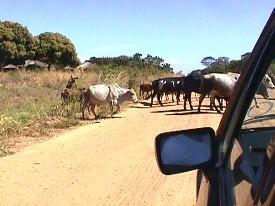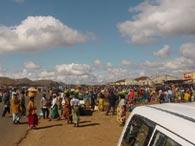Goats With Death Wishes
 Driving in Malawi comes with a unique set of challenges and yummy fried chippies.
Driving in Malawi comes with a unique set of challenges and yummy fried chippies."Distances between [Malawi's] major centers are short and the roads are good."
--Lonely Planet's Getting Around
'Short' and 'good' are relative terms, as places can be physically close together but feel far away in reality. Roads can be paved, but that doesn't mean you can drive on them with ease. The stress of driving is one factor that makes Malawian car journeys feel much longer for a visitor. Driving four hours between Lilongwe and Mzuzu, for example, can feel more like eight hours. There are several variables that make driving in Malawi a nail-biting experience for the uninitiated.
Your ASPCA Don't Work Here
Animals are a big part of the driving experience. Goats and chickens are constant nuisances, but they are also an important source of food here so you need to watch out for them. Goats -- those ornery four legged fiends! -- have a bizarre death wish and almost always dart into the road right in front of an approaching car. Miraculously, many goats manage to escape; but often that's because Malawian drivers make extraordinary efforts to avoid hitting them because they know how important these creatures are to their owners. Local drivers are as in tune with the sudden movements of a roadside goat as a New York driver is with a jay-walking pedestrian: the local driver can better gauge the likelihood that the goat or pedestrian is going to step into their path than the visitor.

It doesn't sound too politically correct, but you should keep on driving if you hit one of these animals. Remember, accidents happen. If you stop your vehicle to explain or offer remuneration, there is great chance that you will be the target of severe verbal abuse or worse. If you are in a populated area, crowds will quickly form and things will escalate rapidly due to the spectacle of it all. Remember what you may look like to others: i.e. a callous foreigner with plenty of money who has little regard for other people's property. Keep driving. The goat or chicken will still get eaten, just sooner than planned.
The Road Walkers
 Road walking is the act of traveling by foot or by bicycle on the nicely paved road, as opposed to using the dirt footpaths that run beside the tarmac. This is a common practice in Malawi and can give visitors stomachaches as they drive, narrowly missing the pedestrians walking on the road. It is a normal occurrence to see men riding bicycles piled high, sometimes over five feet, with chopped firewood, or women carrying large cloth-wrapped bundles on their heads. The number of road walkers exponentially increases as you near the outskirts of a city, town, or trading center. Some paved roads are as crowded as a city sidewalk at rush hour, and the average driver may cry out in frustration about having to drive through such a thick sea of people when roads are supposed to be for cars in the first place.
Road walking is the act of traveling by foot or by bicycle on the nicely paved road, as opposed to using the dirt footpaths that run beside the tarmac. This is a common practice in Malawi and can give visitors stomachaches as they drive, narrowly missing the pedestrians walking on the road. It is a normal occurrence to see men riding bicycles piled high, sometimes over five feet, with chopped firewood, or women carrying large cloth-wrapped bundles on their heads. The number of road walkers exponentially increases as you near the outskirts of a city, town, or trading center. Some paved roads are as crowded as a city sidewalk at rush hour, and the average driver may cry out in frustration about having to drive through such a thick sea of people when roads are supposed to be for cars in the first place.To accommodate road walkers, it is a good idea to choose your path, use your horn sparingly -- and most importantly, to slow way down. The bike or pedestrian will adjust their path to make way for the vehicle. Usually when the driver attempts to choose a new path at the last second, the bike or pedestrian moves in the same direction. (You know that feeling.) This will inevitably lead to another massive over-correction by the driver to narrowly avoid a tragedy.
If tragedy occurs and you hit a person, you should NOT get out of your car if you pick up an angry vibe from bystanders. It seems horrible, but if a visitor senses growing anger, s/he should drive to the
 next police station and return with a police officer. Reason: an angry mob is always a bad thing. Malawians are, in general, a peaceful bunch. One thing that ticks them off, though, is foreigners who drive too fast on their roads. If you are driving carefully and slowly, and a crazy person jumps in front of your car, the crowds may come to the consensus that you aren't at fault. (This is rare, even for volunteers who are fluent in the local language.) If you are speeding and hit someone, especially a child, you may be in danger if you get out to help. Keep driving to the next town and ask where a police station is.
next police station and return with a police officer. Reason: an angry mob is always a bad thing. Malawians are, in general, a peaceful bunch. One thing that ticks them off, though, is foreigners who drive too fast on their roads. If you are driving carefully and slowly, and a crazy person jumps in front of your car, the crowds may come to the consensus that you aren't at fault. (This is rare, even for volunteers who are fluent in the local language.) If you are speeding and hit someone, especially a child, you may be in danger if you get out to help. Keep driving to the next town and ask where a police station is.Roads of Licorice... or Swiss Cheese
The roads in Malawi range from shiny, licorice black tarmac to axle-busting, Swiss cheese-like mudholes. Roads in many nations are set up to transport large items and the military to all parts of the country. To maintain roads takes money, usually from taxes. Malawi is not very wealthy and does not have a large military; but it does
 get help from international donor agencies that allows it to maintain the roads. However, if an agency leaves or the money is spent on something else, the roads do decline in certain areas. The deterioration is further caused by overloading semi trucks, especially during the tobacco season, so that they exceed the weight limits of the roads. Naturally, the pavement splits from such stress. The cracks are not repaired often so the flux of heat and cold causes larger cracks, leading to treacherous potholes that are famous for eating car tires. Ask around before you go speeding on any Malawian roads, as it is better to go slow and not break your axle. Also, bridges are treacherous in low-lying areas where rivers flash flood. Unfortunately, many of the bridges are rebuilt in the same spot over and over again instead of in a better position.
get help from international donor agencies that allows it to maintain the roads. However, if an agency leaves or the money is spent on something else, the roads do decline in certain areas. The deterioration is further caused by overloading semi trucks, especially during the tobacco season, so that they exceed the weight limits of the roads. Naturally, the pavement splits from such stress. The cracks are not repaired often so the flux of heat and cold causes larger cracks, leading to treacherous potholes that are famous for eating car tires. Ask around before you go speeding on any Malawian roads, as it is better to go slow and not break your axle. Also, bridges are treacherous in low-lying areas where rivers flash flood. Unfortunately, many of the bridges are rebuilt in the same spot over and over again instead of in a better position.Bribery and Hard Boiled Eggs
A final obstacle, literally, is the roadblock. This is a way for police or military
 to stop vehicles and check them out. At the more serious stops, there is an actual gate manned by a contingent of military personnel. At smaller roadblocks, a long wooden pole is supported up by two oil barrels. These are staffed by a three or four man contingent. Some roadblock guards have guns which can make visitors nervous. Don't be intimidated, as many of these guards are friendly. Of course, some are not, so just play it by ear but err on the side of politeness.
to stop vehicles and check them out. At the more serious stops, there is an actual gate manned by a contingent of military personnel. At smaller roadblocks, a long wooden pole is supported up by two oil barrels. These are staffed by a three or four man contingent. Some roadblock guards have guns which can make visitors nervous. Don't be intimidated, as many of these guards are friendly. Of course, some are not, so just play it by ear but err on the side of politeness.The vast majority of Malawian roadblocks are safe and corruption is minor...not absent, however. There is a reason that traffic policemen positions are sought after: because of the bribes that are paid to speed things up or smooth things over. But for the most part, if you are respectful and avoid expressing frustration or nervousness, the roadblock should be a painless experience. There is a chance that the police will ask to look in the back of your car, under the hood, or at your ID. Cooperate and things will be fine. Don't get angry if some vehicles sail through while you wait; these are usually aid organizations, government workers, or someone else with official clearance. The more irritable you become, the longer you will wait.
Roadblocks are rarely set up in unpopulated areas, by the way. The larger the
 roadblock, the more people are set up to sell their wares. In Malawi, these range from old hard-boiled eggs (avoid!) to fried potato chippies with roasted tomatoes (yum!). You can also do a bit of grocery shopping at some roadblocks, as many of them have vendors that sell cheap vegetables, bread rolls, nuts, cookies, drinks, matchbooks, and cigarettes. A roadblock can actually be a welcome stress release after tough driving conditions.
roadblock, the more people are set up to sell their wares. In Malawi, these range from old hard-boiled eggs (avoid!) to fried potato chippies with roasted tomatoes (yum!). You can also do a bit of grocery shopping at some roadblocks, as many of them have vendors that sell cheap vegetables, bread rolls, nuts, cookies, drinks, matchbooks, and cigarettes. A roadblock can actually be a welcome stress release after tough driving conditions.




<< Home